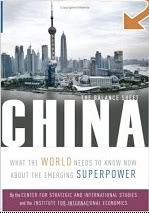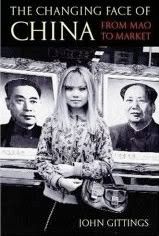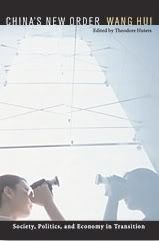The ideological debate in China
Pallavi Aiyar
FOR THE first time in over a decade, both the Chinese intelligentsia and political establishment are embroiled in an intense ideological debate about socialism and capitalism, which for long seemed to be buried by consecutive years of rocketing economic growth. Substantial inequalities, vanishing provisions for education and health care, and rampant corruption have combined to create disenchantment across sections of Chinese society, giving resonance to the voices of critics of China's economic reform, who represent a resurgent "New Left."
The strength of these socialist-leaning thinkers was evident when during the country's annual meeting of its parliament, the National People's Congress (NPC) in March, critiques by them forced the Government to delay the approval of a draft law intended to protect property rights. The critics charged that the new law gave too much weight to the protection of private property. The most widely cited opposition came from a jurisprudence professor at Beijing University, Gong Xiantian, who has been campaigning against the draft law for the last year or so, charging that it offered equal protection to a "rich man's car and a beggar man's stick." The fact that the law does not state that socialist property is "inviolable" has also come in for particular criticism.
The proposed law had taken eight years to prepare and was intended to codify the protection of private property that was enshrined in the constitution two years ago. Its rejection is just one symptom of the deeper underlying debate about the future direction of China's economic policies.
In the span of 25 years, China has gone from being one of the world's most equal, albeit poor societies, to becoming the fourth largest economy in the world with considerable rich-poor imbalances. China's gini index — a commonly used statistical measure of inequality where 0 represents perfect equality and 100 perfect inequality — figure of 44.7 is worse even than India's 32.5, according to the UNDP's 2005 Human Development Report.
Property that used to be taken away from the rich for redistribution to the poor is today routinely taken away from farmers and given to real estate developers. According to the Ministry of Public Security, in 2005 there were a total of 87,000 mass protests across the country, expressing public anger against official corruption, illegal land seizures, and unpaid wages and pensions. The number of such protests has seen a significant increase over the last decade.
China's New Left thinkers have used this background to give force to their criticisms. "Our primary aim is to deconstruct the illusion of neo-liberalism in China," says Wang Hui, a leading leftist intellectual and Professor of Humanities at Beijing's Qinghua University. Worker's rights, rural reform, health and education, and re-orientation of the government's SOE (state-owned enterprise) reform process are the primary foci of the New Left agenda. It is their belief that the current direction of economic liberalisation in China has led to a nexus between party bigwigs and business interests who have plundered the nation's assets under the cover of privatisation. "Today we are no longer an isolated group of intellectuals. We have become a broad-based movement with real support from the people which gives us clout," says Professor Wang.
Indeed, both the rhetoric and policies of China's current leadership duo, Hu Jintao and Wen Jiabao, appear to mesh to an extent with those of the New Left. The leadership has thus made tackling income inequalities between China's rich urban and poor rural areas the centrepiece of its new five-year plan. Since taking office in 2003, Mr. Hu has also tried to establish his left-oriented credentials by extolling Marxism and encouraging research to make the country's official socialist ideology more relevant to the current era. Moreover, he has tried to distance himself from his predecessor Jiang Zemin, who invited private businessmen to join the Communist Party, negotiated China's accession to the WTO, and stepped up the privatisation of SOEs.
In the 1990s, first under Deng Xiaoping, who called economic development "hard truth," and later Jiang Zemin, ideological discussion about the direction of change was sublimated. During that time, China laid off over 20 million workers from SOEs in a huge wave of closures, mergers and privatisations that halved their number since the mid-1990s.
It is only after Mr. Hu came to power that leftist opposition to China's reforms has increased. Now, leading proponents of the New Left including Liu Guoguang, a former vice-director of the Chinese Academy of Social Sciences, and Hong Kong-based economist Lang Xianping, charge that privatisation of SOEs through management buyouts are nothing but asset stripping. As with the property law, the New Left's criticisms seem to have had an influence on the decision to suspend the practice of management buyouts, taken in 2005. Whether or not China's resurgent ideological debate will derail the country's economic growth is another subject for debate. On the one hand, in a speech to the NPC in March, Mr. Hu declared that China must "unshakably persist with economic reforms."
However, some scholars are worried. "My concern is that the pre-eminence given to the income gap issue these days might hijack the reform agenda, which remains incomplete," says Professor Feng Lu of Beijing University's China Centre for Economic Research. He cites a Chinese adage: "If you want to walk a 100 kilometres and have completed 90 of these, you still have 50 per cent of the distance to go." "The last 10 per cent in many ways is the hardest," says Professor Feng citing unfinished business on the reform agenda from SOE privatisation in key sectors to financial sector reform. He shares New Left concerns regarding the need to improve education and health care services but where he differs is in his belief that simply injecting large amounts of cash from the Centre will not solve the problem.
China's Government has recently announced that it will spend a total of 339.7 billion yuan (about $42.4 billion) in rural areas in a bid to ensure a more equitable distribution of the fruits of the country's economic successes and create what has been called "the new socialist countryside." "There is a belief that the crisis in health care and education comes from their having been left to market forces. But this is nonsense. Both remain more or less monopolies of the government and what we really need is an expanded role for the market in these areas," Professor Feng says.
China's economic boom shows scant signs of slowing down. Mr. Hu recently announced that China's GDP grew by 10.2 per cent in the first quarter of this year. Financial sector reform is proceeding, if slowly. Many local governments are predicting double-digit growth in their own five-year plans. But the time when reform could proceed apace without opposition seems to have passed. China today is witnessing an ideological debate that many had dismissed as no longer relevant. It has instead proved to be not only relevant but potentially the key to deciding the shape of the country's future.***
Read more!



